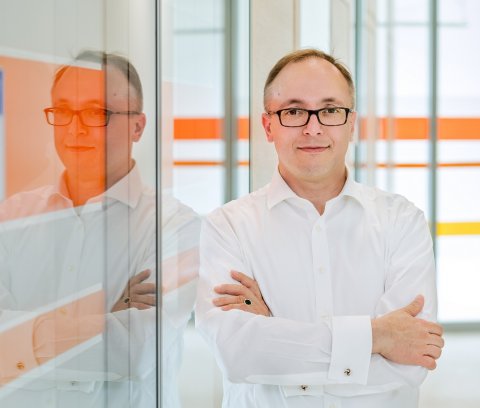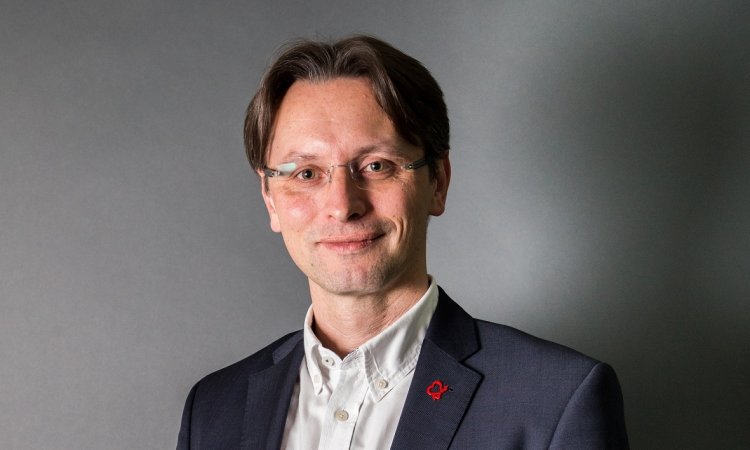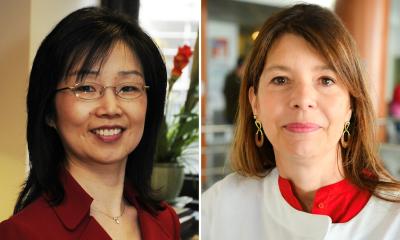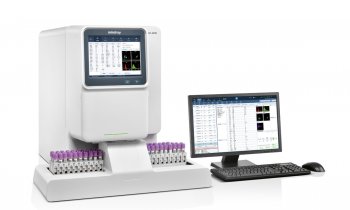Photo: Heinz Troll
Article • Flow cytometry
Living cells – the essential biomarker
The team of the Heinz Nixdorf Chair of Biomedical Electronics at the Technical University of Munich focuses on innovative diagnostic tools to accelerate the development towards personalized medicine.
Therapies tailored to the individual patient – this is the future not only of oncology but of many medical disciplines. “At this point, however,” concedes Professor Dr Oliver Hayden, “personalisation is still a rather distant vision.” In order to turn the vision into reality, diagnostic tools which provide quantitative data are required. Thus, Professor Hayden, who holds the Heinz Nixdorf Chair of Biomedical Electronics at the Technical University of Munich, and his team are not engaged in conventional medical electronics research but explore new forms of flow cytometry for the analysis of cell function. “The living cell is the essential biomarker,” Hayden emphasizes. He is convinced that currently used biomarkers such as blood values and inflammation markers do not offer sufficient information for personalized therapies: “It is not the individual protein or the individual gene that is the smallest functional unit of the organism.”

The team in Munich therefore combines optical, magnetic and acoustic sensor systems with microfluidics. Microfluidics looks at the behaviour of fluids in minute spaces and provides methods to analyse tiny numbers of cells. The research projects based at the Technical University’s Translational Cancer Research Center (TranslaTUM) focuses on the cooperation of an interdisciplinary team of engineers and clinical researchers to develop new diagnostic methods. “Our technologies can potentially be used at the point of care, the central lab or in pre-clinical research,” says Hayden who by the way cannot understand the current hype about POCT. “The central lab will never be obsolete,” he underlines. If a biomarker is stable enough to be transported and the relevant parameter does not have to be determined right away, POCT in Professor Hayden’s opinion does not make a lot of sense in a clinical environment – not to mention the cost factor: “The central lab is and will remain the most cost-efficient solution.”
“Laboratory medicine is in fact an industrial process,” Hayden opines: you try to standardise, achieve maximum throughput and keep the costs down. Thus it is important, as in manufacturing, to integrate pre-analytics, analytics and post-analytics in a single workflow which indeed the team at the Heinz Nixdorf Chair of Biomedical Electronics aims to do. “Workflow integration is often seen as relevant only to industry. But any university which wants to be competitive has to work on integrative solutions,” Hayden underlines and adds that their „mandate is translation; that is at some point in time the team‘s lab developments have to arrive bedside or in research.” The research centre TranslaTUM on the campus of the hospital rechts der Isar in Munich, Professor Hayden says, “will enable engineers to speed up research and through the cooperation with clinicians and companies to fulfil its translation mandate.”
Profile:
Professor Dr Oliver Hayden is Heinz Nixdorf Chair of Biomedical Electronics at the Technical University of Munich. After obtaining his doctoral degree in biochemistry in Vienna in 1999 he did postdoc research in nanotechnology at Harvard. In 2011 he received an MBA from Julius Maximilian University in Würzburg, Germany. Born in Steyr (Upper Austria), the scientist’s work has been recognized with a number of awards, e.g. in 2017 the European Inventor Award for the development of a rapid blood test for malaria. He authored more than 80 publications and is named inventor or co-inventor in close to 80 patent families.
17.05.2019











